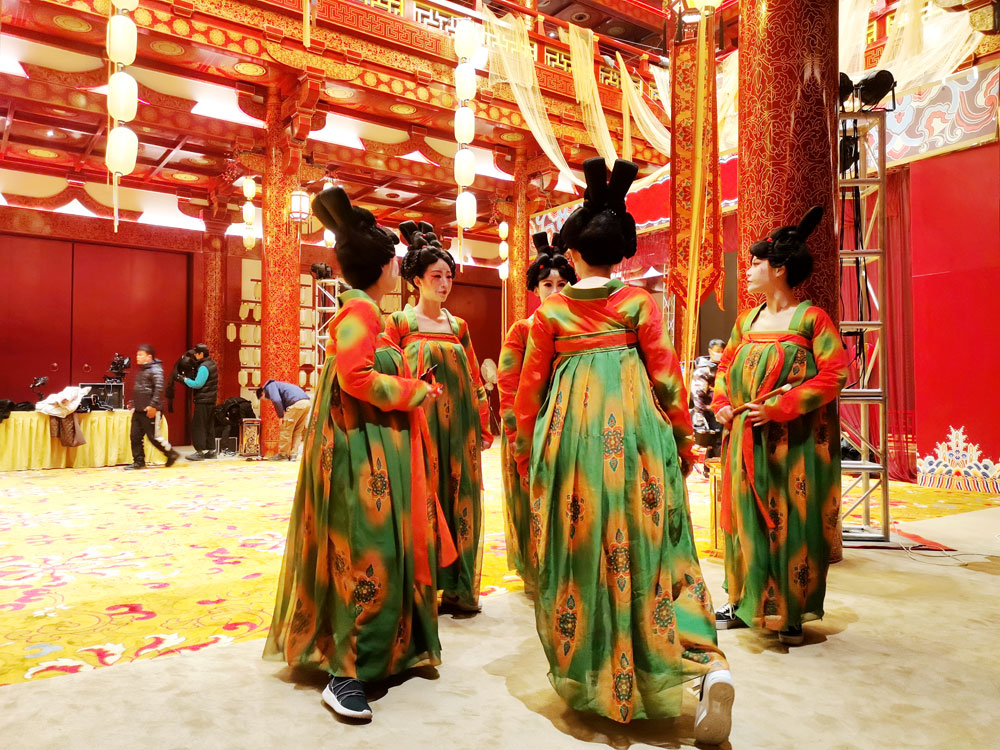Youths in China warm to patriotism


During the weeklong Spring Festival holiday, which started on Feb 11, a dance performance became one of the trendiest topics on Chinese social media, garnering more than 2 billion views on various platforms.
The show, broadcast by Henan Television, and titled Night Banquet in Tang Dynasty Palace, portrayed an evening in which a dozen female musicians prepared to perform at the royal palace.
Dressed in Tang Dynasty (618-907) costumes and wearing traditional makeup, the performers danced against a backdrop provided by 5G technology. The show also featured cultural elements such as local opera and artifacts from the Henan Museum in Zhengzhou, the provincial capital.
The performance triggered a huge sensation online, with one netizen describing those taking part as "terracotta figures of the Tang Dynasty coming alive and escaping from museums".
The show proved particularly popular among young people.
On Bilibili, a video-sharing site where the primary users are those born in the 1990s and later, the footage has been played more than 5 million times, receiving over 27,000 instant comments. The site specializes in such remarks, known as "bullet comments", which are flashed across the top of the screen as users watch videos.
One user posted while watching the video of the dance: "A gem of our culture. Can't believe such a joyful dance could bring tears to my eyes."
Zhang Yiwu, a member of the CPPCC National Committee and also a professor of Chinese studies at Peking University, said the show was a good example of making traditional culture "come alive".
Its popularity also reflected the fact that young people have a keen interest and pride in traditional Chinese culture, he said.
Such culture is not the only issue instilling pride for their country among young people.
For example, according to the website of the Communist Youth League of China, a central association representing young people, it has more than 15.7 million followers on Sina Weibo. Each post related to topics such as national unity, patriotism and the country's development has received thousands of comments and "likes".
On March 5, the league wrote a post marking the 123rd anniversary of the birth of China's first premier, Zhou Enlai, with thousands of young netizens leaving comments expressing how lucky and happy they felt to be living in the country.
One netizen, "Xu Baobao", posted: "We'll contribute our young energy to national rejuvenation", while another wrote: "May we use our youth to protect China."
The younger generation has helped defend the motherland.
In 2019, when rioting related to an extradition bill broke out in Hong Kong, an online community known as Di Bar, comprising young Chinese living around the world, launched a campaign to explain the issue to a global audience and to voice support on digital platforms for the city's police.
A statement released by Di Bar said the community's campaign was driven by "patriotism, rationality and truth-seeking", and reflected its confidence and faith in the country.
Laurence Zhang, 25, a Chinese mainland graduate from Hong Kong Baptist University, who joined the campaign, said the experience gave him a greater understanding of the country's developing power. He added that he felt grateful to live during such times.
Data show that Chinese born since 1990 tend to have a stronger sense of national pride.
In 2019, a survey conducted by China Youth Daily's social research center showed that the post-'90s and post-'00s generations rated their level of national pride 9.38 and 9.21 out of 10 respectively-h(huán)igher than other age groups. Their confidence in the nation's development was also higher than respondents in other age groups.























